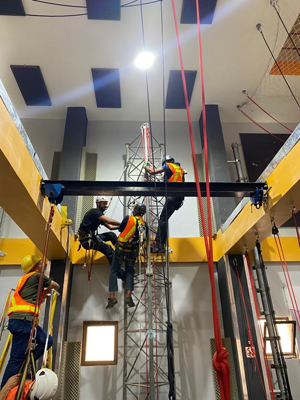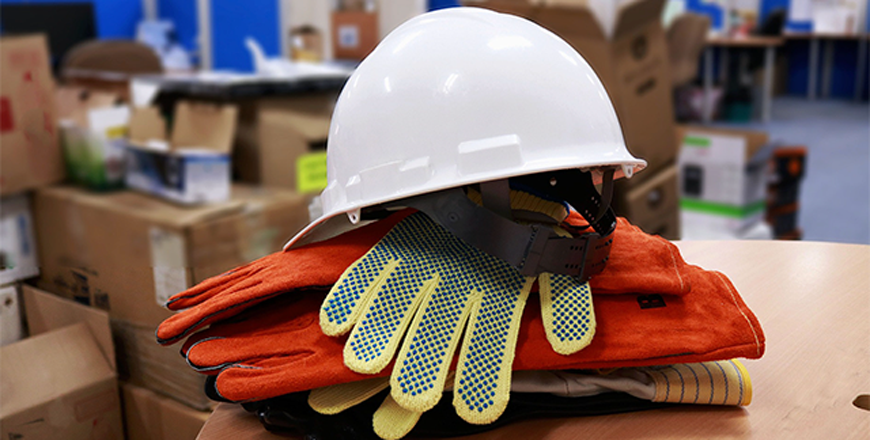You are here
Alarming work-related injury rates in Jordan — report
By Rayya Al Muheisen - Nov 21,2023 - Last updated at Nov 20,2023
AMMAN — Work-related injuries in Jordan result in a fatality every two days, imposing an economic cost equivalent to approximately 4 per cent of its GDP, according to a report.
Workers House, a local civil institutions and NGO dedicated to advocating for the rights of workers, issued a report revealing an annual average of 14,000 work-related accidents, causing injuries and approximately 200 deaths, “at a rate of one work injury every 37 minutes and one death every two days”.
According to the report, the manufacturing sector has the highest percentage of accidents, with more than 30 per cent of total injuries, followed by the wholesale and retail sector, with 18 per cent and the construction sector with 13 per cent.
Injuries caused by falling constitute the highest percentage of work injuries, with more than 30 per cent of total injuries, followed by injuries resulting from falling objects, constituting 14 per cent, and injuries resulting from manual tools, with 12 per cent, according to the report.
“Four per cent of the GDP is lost as a result of the costs of injuries,” the report stated.
The report points out that these figures do not reflect the actual number of work injuries in Jordan, “which is certainly much higher, due to several reasons”.
Workers in the informal economy, estimated to constitute approximately 48 per cent of the total workforce in the Kingdom, are not covered by social security, said the report.
“The same goes for workers in the agricultural sector, which, globally, has the highest rates of work injuries,” the report added.
More than half-a-million workers do not have social security or any kind of insurance, the report said.
Some facilities that are covered do not report injuries and prefer to cover injury expenses through insurance companies,this approach is adopted to maintain a clean record with the Social Security Corporation (SSC), the report added.
The report pointed to a clear shortage, in the Labour Ministry’s inspection teams’ personnel, who are specialised in monitoring compliance with occupational safety and health conditions at work sites.
The annual rate of visits by labour inspectors to check occupational safety and health reaches approximately 5,000, while the number of establishments operating in the Kingdom, according to the Department of Statistics, is 180,680, said the report.
On the legislative level, the report indicates that although the Labour Law has devoted a special chapter to the subject of occupational safety and health and issued a number of regulations and instructions, particularly regarding precautions safeguarding institutions and employees against work hazards, Jordanian laws and regulations need more comprehensive and technical texts that include specialised directives to prevent risks in each sector.
Mohammad Zyoud, spokesperson of the Labour Ministry, told The Jordan Times that the ministry is committed to providing a safe working environment for employees in private sector facilities, in addition to reducing workplace injuries in these facilities.
“To achieve this, the ministry has developed a system of occupational safety and health regulations over the past two months, and all of them will come into effect after their publication in the official gazette,” said Zyoud.
Zyoud added that these regulations include the formation of occupational safety committees and the appointment of supervisors in establishments for the year 2023, the system of preventive and therapeutic medical care for workers in establishments for the year 2023, and the system of occupational safety, health and prevention of occupational hazards in establishments for the year 2023. “All of these regulations are issued in accordance with Article 85 of the labour law,” said Zyoud.
Zyoud emphasised that all these regulations represent a qualitative leap in providing a safe and healthy working environment and ensuring the necessary protection for employees in private sector establishments.
“The regulations aim to guarantee employees safety and health. The regulations also increase employers’ compliance with providing a safe working environment for their employees, preserving their safety and health,” Zyoud noted.
Zyoud highlighted that the amendment of the regulations will enhance workers’ productivity, reduce downtime which would positively impact the establishments’ operations, prevent delays due to increased workplace injuries and thereby maintain the continuity of their operations.
Ghanim Ghunaim, an occupational safety expert, expressed concern on the alarming rates of work-related injuries in Jordan.
“The statistics reveal a significant need for immediate and comprehensive measures to enhance workplace safety,” Ghunaim told The Jordan Times.
Ghunaim added that it is crucial to address the gaps in social security coverage, particularly for those within the informal economy, to ensure the well-being of a substantialportion of the workforce.
A construction worker who preferred to remain anonymous told The Jordan Times that there are many challenges faced by workers in the industry that are contributing to work related injuries.
“Fatigue and stress are major contributors to work-related injuries,” the source said.
He emphasised that employees who are overworked, stressed or fatigued, usually working in the shadow market, are more prone to making mistakes that can result in accidents and injuries.
The source highlighted the lack of social security subscriptions among construction workers. “The majority of construction workers do nothave an SSC subscription. Therefore, the majority of their injuries are not even calculated in the annual rate,” he noted.
He recounted an incident involving a colleague who fell on a construction site, resulting in permanent paralysis. “The incident was not even reported,” he said.
Related Articles
AMMAN — Occupational safety experts are urging for more stringent measures to combat work-related injuries, with a particular focus on
AMMAN — On World Day for Safety and Health at Work, Jordanian human rights and labour rights organisations call for increasing occupational
AMMAN — The Social Security Corporation (SSC) said on Monday that it registered 17,746 work-related injuries across various sectors in 2022,














